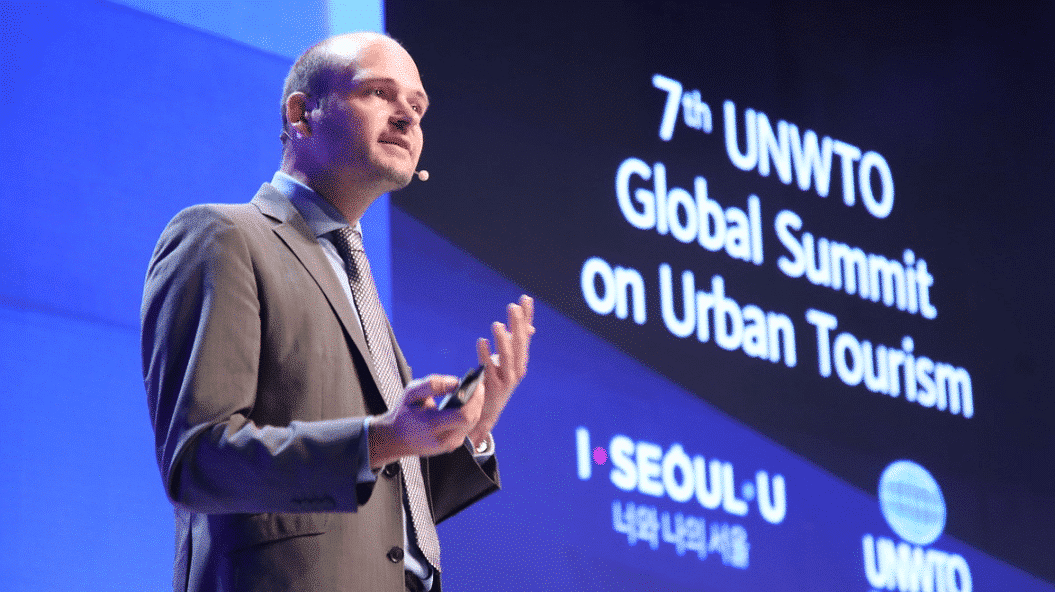Tourism can be negative for a city and its inhabitants, and that needs to change according to Ko Koens, lecturer on New Urban Tourism at Hogeschool Inholland. In his inaugeral lecture, he philosophises about a new template for tourism.
It is financially beneficial for cities to attract tourists, so for a long time, income has been a major motivation for cities to encourage it. But cities like Barcelona and Amsterdam have seen the other side of the coin; that visitors to a city can cause nuisance to its residents.
Nuisance caused by tourists
Ko Koens, who lectures on the New Urban Tourism at Hogeschool Inholland, studies new templates for tourism whereby residents of the city have a voice and the city does not suffer from the influx of tourists. As Koens explains: ‘You want to avoid a situation in which a city’s residents consider tourism to be an annoyance. Whenever tourists cause nuisance or people feel that there are simply too many tourists, this will affect their living experience’.
Changing the contours of tourism
During his inaugeral lecture on Wednesday 2 June 2021, Ko Koens will be posing the question: ‘How can we change tourism and break through the current system?’ He feels that you must explore at a hyper-local level if you want to achieve that. It is crucial that initiatives are built from the bottom up, rather than the perception being that only the city council determines what happens in the city. Ko Koens: ‘Activities and sites should be created for residents rather than for tourists’.
Exploring at a local level
That means it is essential to liaise with city dwellers and entrepreneurs alike. Says Ko Koens: ‘Needs will differ from one city quarter to another, and even from one street to another. By engaging in dialogue, you can find out what residents want. Do they even appreciate visitors, and if so, along what lines? Do they like to meet people in this way, do they want to show off their culture, or does tourism ensure that neighbourhood facilities like public transport are better maintained?’
Start by visualising your ideal picture
Ko Koens: ‘Obviously, the needs of residents are bound to differ from those of entrepreneurs. Nevertheless, I think that, eventually, we all want the same; namely to be an eventful and hospitable city. That needs to become the starting point. If a city, together with all parties involved, can visualise their ideal view of tourism, this will create a concrete perspective. What do we want to achieve in the long term? Starting from that point, you can work back; how do we get there?’
Identity of the city
Operating at a local level is not the only thing that matters; cohesion between the city quarters is also crucial. The city is a unit, and a prevailing vision must remain in place. This is how a city retains its identity, rather than all cities becoming ‘much of a muchness’, as can happen with gentrification. Ko Koens says: ‘That is what happens in East Berlin, where hip-and-happening bars and clubs attract visitors and ensure prosperity for the neighbourhood; but what good is that to the local residents?’
Changing the mind-set
‘A change of mind-set is required to adjust the current system’, says Ko Koens. ‘Quite often, the success of tourism is measured in terms of its economic value, whereas social advantages are, in my view, much more important. This is especially so when aiming for a sustainable form of tourism that will make residents proud of their city and give them a feeling of belonging. Then again, with various people making use of the same space, empathy is also indispensable. I want to explore ways in which we can connect better with one another’.
Design-oriented investigation
Ko Koens is involved in the Urban Leisure & Tourism Lab Rotterdam from his position at Hogeschool Inholland, and hopes to solve a number of issues by experimenting within the city quarters. He says: ‘During our explorations we not only ask questions but also effectively try things out, not only with students, but with partners as well. We do not think from solutions, but approach issues with an open mind. After all, we don’t know the answers either’.
Ko Koens’ inaugeral lecture is scheduled for Wednesday 2 June 2021 and will be delivered in English. Sign up here.
